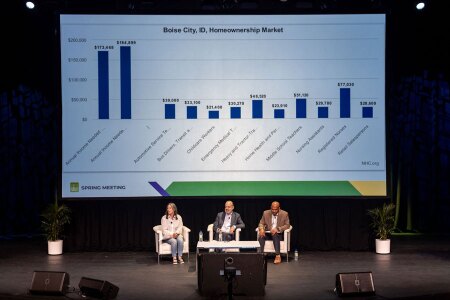
From left to right: Molly McCabe, chief executive officer of development and investor advisory firm HaydenTanner; Christopher Ptomey, executive director of the ULI Terwilliger Center for Housing; and Kenwin Hayes, managing principal at the real estate planning and consulting firm ReUrbanis Advisors discussing housing affordability at the 2023 ULI Spring Meeting in Toronto.
The problem of housing affordability affects more than just cities with staggeringly high costs like San Francisco, Los Angeles, and New York. The issue is one that has spread to become a crisis across the United States, exacerbated by high inflation, rising interest rates, and a lack of housing supply. Though many people believe the segment most affected is low-income households, large swaths of the population that earn moderate incomes working as teachers, emergency responders, truck drivers, and home health aides are increasingly finding themselves out of options when looking to buy or rent.
“For critical occupations in the workforce, there’s very little affordability across the board,” Christopher Ptomey, executive director of the ULI Terwilliger Center for Housing, said at a 2023 ULI Spring Meeting session in Toronto.
Using charts from the National Housing Conference’s Paycheck to Paycheck database, Ptomey illustrated the uphill battle many Americans face when trying to find housing they can afford in cities both large and small. Of the top 25 occupations employing the most people in the United States, 11 pay less than the wage needed to afford a one-bedroom apartment, according to the National Low-Income Housing Coalition.
How Cities Lose Out
To understand the impact the affordability crisis is having on communities, the ULI Advisory Services program studied several cities and communities across the country. In Boise, Idaho, unprecedented population growth over the past few years has led to a housing crunch that has had cascading effects on the local economy.
Through interviews and discussions with a variety of stakeholders and members of the community, a technical assistance panel found that Boise is having trouble recruiting doctors and nurses because they are unable to pay them enough to meet housing costs. “The Boise market has gone bonkers, truly,” Molly McCabe, chief executive officer of development and investor advisory firm HaydenTanner, said during the session.
Steamboat Springs, Colorado, is dealing with similar issues regarding population growth and housing affordability. When the town’s new police chief relocated to the city from California, she had an extraordinarily hard time finding housing. Though she ultimately did find a place to live, she struggled to recruit police officers to serve the community because of the high housing costs.
In another example, in rural Rabun County, Georgia, a lush region in the northeast corner of the state that has attracted wealthy second-home buyers, including famed college football coach Nick Saban, a large portion of the workforce cannot afford to live in the area where they work. And it is not just affecting residents in lower-paying service jobs: the community struggled to find someone to serve as superintendent of schools because of the lack of housing in the area.
“It was hard to believe that even some of the highest-paid individuals in the community couldn’t afford something,” said Kenwin Hayes, managing principal at the real estate planning and consulting firm ReUrbanis Advisors. “It opened our eyes to think . . . we’re thinking of this a little wrong.”
Strategies to Meet the Need
In addressing the housing affordability crisis, experts agree that the issue is complicated and will require a multipronged approach. Actions that community leaders and those in the real estate industry can take now include educating the community about different kinds of housing—especially regarding density—and their importance to the overall housing supply; identifying the critical partners needed in efforts to build more housing; and treating housing as infrastructure.
In Boise, where McCabe was a member of the ULI advisory panel, a strategic plan was created for the city that separated actions to be taken in the immediate and long term.
Among the first tasks were extending affordability periods in the city, starting outreach on rent-restricted units, and identifying targets for preserving multifamily housing.
Medium- and longer-term actions recommended included implementing a five-year housing plan, developing relationships with area financial partners to support investment, and completing the city’s zoning rewrite process. The panel also recommended that Boise continue reporting on and educating the public about housing metrics and tools.
Partnerships between city leaders and members of the real estate industry are especially important as more cities across the country experience housing shortages and grapple with the impacts. “It’s not just small cities seeing those challenges; we’re seeing it more and more from secondary and tertiary cities having a lot of issues with affordability,” said Ptomey.
But as community leaders and stakeholders look to take action to tackle the housing crisis, it is important to remember that at the heart of all of the problems faced by cities and towns, the key to the solution is getting more housing built, said McCabe. “We have an insufficient supply, period,” she said. “We can’t afford to wait; we are currently in a crisis.”
Learn more: ULI Home Attainability Index





